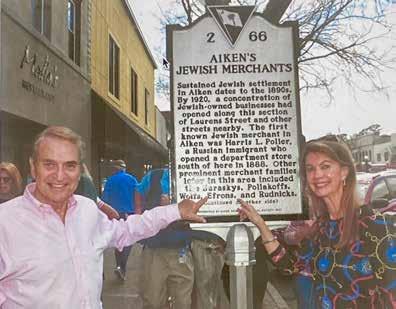
4 minute read
Mitch Rifkin First Learned About the Holocaust During College - Now He Chairs the NC Holocaust Foundation
September 2023
By Amy Lefkof
From all outward appearances, Mitch Rifkin’s family looked like any other family in Aiken, South Carolina, in the 1940s and ‘50s. His father, Marvin, owned an Esso gas station on U.S. Highway 1 North. And Marvin’s Dining Room, specializing in fried shrimp, was a favorite hangout of Aiken’s teens, where a “curb hop” went to customers’ cars to get orders.
But the Rifkin family was different from most of their Aiken neighbors: they were Jewish. Rifkin’s mother, Mollie Efron Rifkin, traced both sides of her family back to Belarus. Largely because of religious persecution, the Efrons and Suraskys left Russia in the late 1800s. In America, their Yiddish names morphed into American-sounding names. His great-grandmother Ida Surasky Efron came to Aiken in 1920 when her husband died, to be with her five brothers, the Suraskys. Her seven children soon followed.
Rifkin grew up with a mezuzah affixed to the doorway of his childhood home and an occasional Friday night Shabbat dinner. Before each Passover, his mother would travel to Augusta, Georgia, about 17 miles away, to bring back kosher chickens and beef. The bathtub became unusable for Rifkin and his sisters for two days as his mother used it to kosherize dishes before Passover. And his mother made sure that one night of Chanukah always “fell” on Christmas so that her children would not feel left out.
While his family mainly attended synagogue during religious holidays, Rifkin was prepared for his bar mitzvah by a wonderful layperson in the congregation, and that’s the moment his Jewish identity really took hold and became a part of him.
Rifkin estimates that at least twenty-five of Aiken’s downtown businesses were Jewish owned. When his maternal grandfather, Jake Efron, passed away, the Aiken Standard and Review published his obituary.
It touted not only his operation of one of Aiken’s first supermarkets, Efron’s Red & White Supermarket, but also his civic work, noting that he “was active in his church, the Adath Yeshurun Synagogue.”
For the Jewish Historical Society of South Carolina, Rifkin’s second cousin Stephen Surasky wrote about Aiken’s Jewish families. The essay begins with the 1903 gruesome murder of Jewish peddler Abraham Surasky, one of Rifkin’s great uncles and a widower with two young children.
Despite this targeted hate crime, Rifkin says he personally experienced no antisemitism growing up. What he does recall, however, was a defining moment from his youth when the core commandment of Judaism, “Love your neighbor as yourself” came up against the segregation laws of the South. Rifkin was hanging out at his dad’s Esso station when an African-American man, just traveling through, greeted him and his father and asked if there was a bathroom he could use. Rifkin’s father said, “I’m sorry, there isn’t.” But young Rifkin pointed to a nearby door and said, “What do you mean, Dad? There’s a bathroom right over there.” The elder Rifkin repeated his apology to the traveler who understood that segregation laws prevented him from using the Esso station’s one bathroom. However, the very next morning, Marvin Rifkin built a separate toilet for African-Americans.
It was not until his sophomore year at the University of South Carolina in 1964, during a World History course, that Rifkin truly comprehended what happened during the Holocaust and the role that antisemitism had played. Over the years, Rifkin has taken on the mantle of being “a corrector” to counter antisemitic comments. For instance, he educates people how the term “Jew down” stereotypes Jews as being fixated on money. He can be blunt. “How would it sound if I said ‘Well, I guess I’m gonna have to Christian you up?’” And if people remark to Rifkin, “You don’t look Jewish,” he is likely to shoot them back a look (with his blue eyes) and ask, “What does a Jew look like?”
Since 2017, Rifkin has served as chairman of the NC Holocaust Foundation, the funding arm of the NC Holocaust Council. Rifkin notes that the Holocaust Council, a state agency organized under the North Carolina Department of Public Instruction, “is the first responder to hate crimes and antisemitic incidents throughout the State,” tasked with educating public school teachers and students about the Holocaust and combating misconceptions and ignorance about the Holocaust, Jews, and Judaism.
Conveying Jewish values, like the ones embodied by his Aiken childhood Adath Yeshurun Synagogue, which recently celebrated its 101st anniversary, is how Rifkin believes “we will outshine hate and reduce antisemitism.”
As Mitch would say “Shalom Y’All”.












